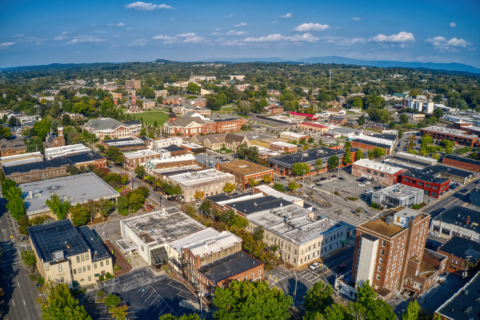As the voice of America’s cities, towns and villages, NLC was a popular resource on issues impacting local governments. NLC experts were quoted in several outlets, ranging from print, broadcast and online publications. Journalists turned to NLC for comments and expert clarification on a variety of issues ranging from public safety, housing, local authority, health and wellness, workforce and the American Rescue Plan Act (ARPA).
Housing
Rental application fees add up fast in a tight market. But limiting them is tough. NPR (January 13, 2023)
Local leaders are committed to addressing housing challenges in their community. Rental application fees are the first barrier to finding affordable housing. A number of states have enacted a law to limit mounting fees for multiple applications. It’s part of a broader push for tenant protections after the pandemic drove home the threat of housing instability and eviction, says Lauren Lowery with the National League of Cities. Landlords oppose limits to application fees, stating that screening is important for tenant safety and that landlords should be able to charge a reasonable fee for it. Laws to lower or eliminate the fees have been difficult to enforce.
Preemption
How cities can navigate their state’s broadband preemption laws. Route Fifty (July 6, 2023)
A core value of NLC is that local governments need the authority to respond to their community’s needs. However, 2023 saw an increase in state preemption laws on municipal broadband expansion efforts. NLC was quoted on the importance of local authority to ensure local leaders can deliver critical and needed internet access to their communities. State-level legislative restrictions can exacerbate local digital divides and resident burdens, said Christy Baker-Smith, a director of research and data at the National League of Cities. Advocates of what NLC calls municipal broadband preemption say the practice may help standardize policy and program implementation across jurisdictions within a state, but, according toBaker-Smith, “the problem is … cities in rural areas and urban areas need very different things, so [the state should] let the cities decide what they need.”
Health and Wellness/Public Safety
A Mental Health Crisis. An Officer’s Gun. A Too-Common Tragedy. The New York Times (July 22, 2023)
Local leaders across the country have been embracing and adopting new and innovative strategies to address public safety in their community. The San Antonio Police Department, like other police departments in other cities, has a Mental Health Unit available to respond to calls that require trained, empathetic responses and support for people in distress. Among the many mental health units at departments across the country, The National League of Cities published a report about San Antonio’s Mental Health Unit, using it as an example for other cities to model and citing the success of its crisis response.
For second year in a row, US gets D+ grade for high preterm birth rate: ‘There’s so much work to be done’. CNN Health (November 16, 2023)
Premature birth rates in the United States remain high, especially in the southern region of the country. The March of Dimes gave the U.S. a D+ for its rate of preterm births, the leading cause of infant deaths in the country. The group has urged more states to extend Medicaid benefits, in which new moms can qualify for Medicaid insurance after giving birth. The National League of Cities has long encouraged cities to consider similar actions to improve maternal and infant health and reduce health disparities, said Lourdes Aceves, health and wellness director at the National League of Cities, who was not involved in the new March of Dimes report. “You have to have a whole-system approach. You can’t only treat the symptoms; you have to treat the root causes. For maternal health, for instance, that’s understanding what the root causes are, like diabetes and hypertension, that’s leading to early deaths,” Aceves said, adding that social determinants of health – the conditions in which people are born and live – play a role in high rates of maternal and infant mortality.
Climate
Local officials want extreme heat to be declared a federal disaster. NBC News (July 28, 2023)
Concerned local and state officials are struggling to manage the climate crisis without federal help. Reps. Ruben Gallego, D-Ariz., Sylvia Garcia, D-Texas, and Mark Amodei, R-Nev., introduced a bill known as the Extreme Heat Emergency Act, that would add extreme heat to FEMA’s list of major disaster qualifying events. In a letter address to Rep. Ruben Gallego, the National League of Cities CEO Clarence Anthony wrote: “By including extreme heat events in the definition of a major disaster … this legislation will empower local governments to establish cooling centers, support vulnerable populations, assist the homeless, and enhance healthcare services during extreme heat events.”
Workforce
Ditch the Degree? Many Employers Are Just Fine With That. US News & World Report (February 3, 2023)
A tight labor market, the high cost of a college education and a pandemic-era re-assessment of work, has led both employers and jobseekers to question the value of university degree. Some states and cities have dispensed with degree requirements for many state jobs and other states and cities are performing similar reevaluations. For example, Philadelphia and St. Paul, Minnesota, have set up apprenticeship programs for municipal jobs, while Denver has partnered with Hertz to offer training and summer job opportunities to youth to install public electric car chargers, says Michael Bartlett, program manager at the National League of Cities.
Infrastructure/ARPA
Infrastructure ‘Boot Camps’ Help Small Cities Get Grants. Governing (August 8, 2023)
A training program operated by the National League of Cities helps small cities apply directly for federal infrastructure funding. Since last summer, more than 600 cities have participated in one of NLC’s boot camp trainings, according to Jonathan Kuhl, a senior executive at NLC. The trainings are part of the Local Infrastructure Hub, a $50 million effort to help cities navigate new federal infrastructure funding opportunities, funded by Bloomberg Philanthropies, Ballmer Group, Emerson Collective, Ford Foundation and The Kresge Foundation. “They’re kind of like college courses,” Kuhl says. “It’s a three- to four-month course and they are all on separate topics that are tied to specific grant opportunities. And they’re timed to correspond with the deadlines for those.”
Federal COVID aid OK’d to pay for roads, natural disasters. Associated Press (January 10, 2023)
State and local governments will have new flexibility to spend federal coronavirus relief dollars on things not directly related to the pandemic, including new infrastructure and aid to people affected by natural disasters. “I think it supercharges the ARPA dollars to be as productive as possible” said Brittney Kohler, legislative director for transportation and infrastructure at the National League of Cities. She added: “We see this as a really valuable tool to make the most of every federal dollar.”
This Pennsylvania city hopes Biden’s infrastructure law can help revitalize its downtown. CNN (June 17, 2023)
Reading, PA is investing in electric vehicle charging stations with the hope to revitalize the city. City officials are seeking federal money provided by the massive infrastructure law passed by Congress in 2021. To receive additional federal funding, a boot camp offered by the Local Infrastructure Hub – which helps cities access the funds provided by the federal infrastructure law. The Local Infrastructure Hub is sponsored by a variety of groups, including Bloomberg Philanthropies and the Kresge Foundation, as well as the National League of Cities and the US Conference of Mayors, among others.
Intergovernmental Relations
FEMA forced to restrict disaster spending because of low funds – POLITICO (August 30, 2023)
The Biden administration stopped helping states rebuild from past disasters with money from the federal government’s main emergency fund, which is nearing depletion from dozens of storms and wildfires this year. The restrictions will put pressure on Congress to approve the president’s request for $12 billion in emergency money to replenish the disaster fund. Under new spending restrictions, the federal disaster fund can be spent only to address life-threatening emergencies. A coalition of major government associations wrote a letter to congressional leaders urging them “to act swiftly” in approving emergency funds and warning that without additional money, “recovery projects will grind to a halt.” The signatories include the National Conference of State Legislatures, the National Association of Counties and the National League of Cities.
Become a Member!
NLC is a strategic partner for local leaders and municipal staff, serving as a resource and advocate for communities large and small. Join our network and get access to timely resources, proven best practices, and connections to peer networks. Join today!








